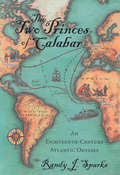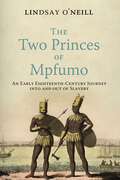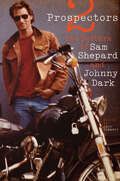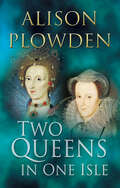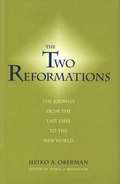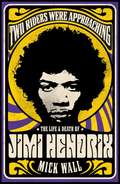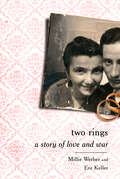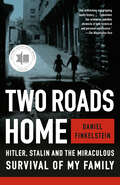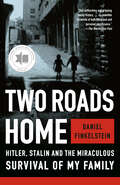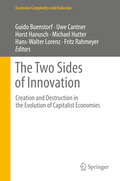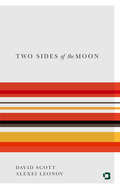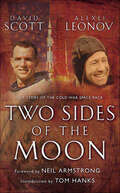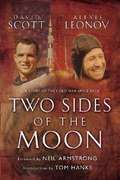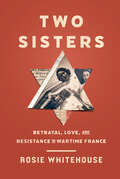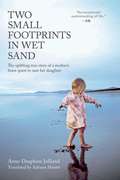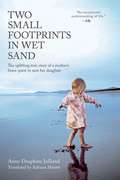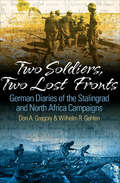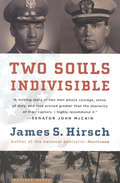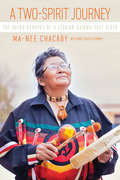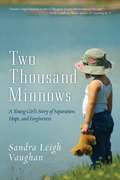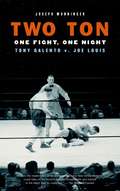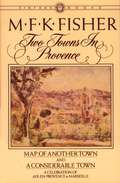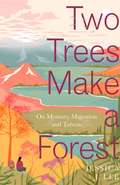- Table View
- List View
The Two Princes of Calabar: An Eighteenth-Century Atlantic Odyssey
by Randy J. SparksThis is a rare glimpse into the 18th century Atlantic World and slave trade from an African perspective. It brings us into the trading communities along the coast of Africa and follows the regular movement of goods, people and ideas across and around the Atlantic.
The Two Princes of Mpfumo: An Early Eighteenth-Century Journey into and out of Slavery (The Early Modern Americas)
by Lindsay O'NeillA fascinating account of two eighteenth-century princes from East Africa, their travels, and their encounters with the British Empire and slaveryIn 1716 two princes from Mpfumo—what is today Maputo, the capital of Mozambique—boarded a ship licensed by the East India Company bound for England. Instead, their perfidious captain sold them into slavery in Jamaica. After two years of pleading their case, the princes—known in the historical record as Prince James and Prince John—convinced a lawyer to purchase them, free them, and travel with them to London. The lawyer perished when a hurricane wrecked their ship, but the princes survived and arrived in England in 1720. Even though the East India Company had initially thought that the princes might assist in their aspirations to develop a trade for gold in East Africa and for enslaved labor in Madagascar, its interest waned. The princes would need to look elsewhere to return home. It was at this point that members of the Royal African Company and the Society for Promoting Christian Knowledge took up their cause, in the hope that profit and perhaps Christian souls would follow. John would make it home, but tragically, James would end his own life just before the ship sailed for Africa.In The Two Princes of Mpfumo, Lindsay O’Neill brings to life individuals caught up in the eighteenth-century slave trade. O’Neill also shows how the princes’ experiences reflect the fragmented, chaotic, and often deadly realities of the early British empire. A fascinating and deeply researched historical narrative, The Two Princes of Mpfumo blurs the boundaries between the Atlantic and Indian ocean worlds; reveals the intertwined networks, powerful individuals, and unstable knowledge that guided British attempts at imperial expansion; and illuminates the power of African polities, which decided who lived and who died on their coasts.
Two Prospectors: The Letters of Sam Shepard and Johnny Dark (Southwestern Writers Collection Series, Wittliff Collections at Texas State University)
by Sam Shepard Johnny DarkSam Shepard was arguably America’s finest working dramatist, as well as an accomplished screenwriter, actor, and director. Winner of a Pulitzer Prize, he wrote more than forty-five plays, including True West, Fool for Love, and Buried Child. Shepard also appeared in more than fifty films, beginning with Terrence Malick’s Days of Heaven, and was nominated for an Academy Award for his performance in The Right Stuff. Despite the publicity his work and life attracted, however, Shepard remained a strongly private man who said many times that he would never write a memoir. But he did write intensively about his inner life and creative work to his former father-in-law and housemate, Johnny Dark, who was Shepard’s closest friend, surrogate brother (they were nearly the same age), and even artistic muse. Two Prospectors gathers nearly forty years of correspondence and transcribed conversations between Shepard and Dark. In these gripping, sometimes gut-wrenching letters, the men open themselves to each other with amazing honesty. Shepard’s letters give us the deepest look we will ever get into his personal philosophy and creative process, while in Dark’s letters we discover insights into Shepard’s character that only an intimate friend could provide. The writers also reflect on the books and authors that stimulate their thinking, their relationships with women (including Shepard’s anguished decision to leave his wife and son—Dark’s stepdaughter and grandson—for actress Jessica Lange), personal struggles, and accumulating years. Illustrated with Dark’s candid, revealing photographs of Shepard and their mutual family across many years, as well as facsimiles of numerous letters, Two Prospectors is a compelling portrait of a complex friendship that anchored both lives for decades, a friendship also poignantly captured in Treva Wurmfeld’s film, Shepard & Dark.
Two Prospectors: The Letters of Sam Shepard and Johnny Dark (Southwestern Writers Collection Series, Wittliff Collections at Texas State University)
by Sam Shepard Johnny DarkThis collection shares decades of correspondence between the Pulitzer Prize-winning playwright and one of his closest friends—including personal photos.One of America&’s leading dramatists, as well as an accomplished actor, screenwriter, and director, Sam Shepard&’s legacy includes immortal plays like True West and Buried Child, as well as memorable film roles, including his Academy Award-nominated performance in The Right Stuff. Though Shepard remained an intensely private man, he wrote candidly about his life and work in letters to his close friend Johnny Dark. His former father-in-law, Dark became a surrogate brother to Shepard, and even an artistic muse. Two Prospectors gathers nearly forty years of correspondence and transcribed conversations between them.In these letters, the men open themselves to each other with gripping honesty. Shepard&’s letters give us the deepest look we will ever get into his personal philosophy and creative process, while in Dark&’s letters we discover insights into Shepard&’s character that only an intimate friend could provide. The writers also reflect on the books and authors that stimulate their thinking, their relationships with women (including Shepard&’s anguished decision to leave his wife and son for actress Jessica Lange), personal struggles, and accumulating years. Illustrated with Dark&’s photographs of Shepard and their mutual family across many years, as well as facsimiles of numerous letters, Two Prospectors is a compelling portrait of a complex friendship that anchored both lives for decades, a friendship also poignantly captured in Treva Wurmfeld&’s film, Shepard & Dark.
Two Queens in One Isle: The Deadly Relationship of Elizabeth I and Mary Queen of Scots
by Alison PlowdenThe relationship between Queen Elizabeth I of England and her cousin, Mary Queen of Scots, is one of the most complex, tempestuous and fascinating in history. United in blood but divided by religion, the two women were in some ways uniquely close; in others, poles apart. Championed by English Catholics as the rightful Queen of England, Mary was nevertheless given protection by her cousin after she was deposed amid outrage at her immoral behaviour. Rumours of papist plots involving Mary were rife and Elizabeth was put under extreme pressure to be rid of this dangerous threat to her sovereignty and to the Protestant church in England. After much reluctance and procrastination Elizabeth finally signed Mary's death warrant. Alison Plowden shows how political fear brought out the worst and yet the best in these women, and how history was overshadowed for centuries afterwards.
The Two Reformations: The Journey from the Last Days to the New World
by Heiko A. Oberman Donald WeinsteinIn this last collection of his vital, controversial, and accessible writings, Oberman seeks to liberate and broaden our understanding of the European Reformation, from its origins in medieval philosophy and theology through the Puritan settlers who brought Calvin's vision to the New World. Ranging over many topics, he finds fascinating connections between aspects of the Reformation and twentieth-century history and thought--most notably the connection to Nazism and the Holocaust.
Two Riders Were Approaching: The Life & Death of Jimi Hendrix
by Mick WallJimmy was a down-at-heel guitarist in New York, relying on his latest lovers to support him while he tried to emulate his hero Bob Dylan. A black guy playing white rock music, he wanted to be all things to all people.But when Jimmy arrived in England and became Jimi, the cream of swinging London fell under his spell. It wasn't that Jimi could play with his teeth, play with his guitar behind his back. It was that he could really play.Journeying through the purple haze of idealism and paranoia of the sixties, Jimi Hendrix was the man who made Eric Clapton consider quitting, to whom Bob Dylan deferred on his own song 'All Along the Watchtower', who forced Miles Davis to reconsider his buttoned-down ways - and whose 'Star Spangled Banner' defined Woodstock. And when his star, which had burned so brightly, was extinguished far too young, his legend lived on in the music - and the intrigue surrounding his death. Eschewing the traditional rock-biography format, Two Riders Were Approaching is a fittingly psychedelic and kaleidoscopic exploration of the life and death of Jimi Hendrix - and a journey into the dark heart of the sixties. While the groupies lined up, the drugs got increasingly heavy and the dream of the sixties burned in the fire and blood of the Vietnam War, the assassination of Martin Luther King and the election of President Richard Nixon. Acclaimed writer Mick Wall, author of When Giants Walked the Earth, has drawn upon his own interviews and extensive research to produce an inimitable, novelistic telling of this tale - the definitive portrait of the Guitar God at whose altar other guitar gods worship.Jimi Hendrix's is a story that has been told many times before - but never quite like this.
Two Riders Were Approaching: The Life & Death of Jimi Hendrix
by Mick WallJimmy was a down-at-heel guitarist in New York, relying on his latest lovers to support him while he tried to emulate his hero Bob Dylan. A black guy playing white rock music, he wanted to be all things to all people.But when Jimmy arrived in England and became Jimi, the cream of swinging London fell under his spell. It wasn't that Jimi could play with his teeth, play with his guitar behind his back. It was that he could really play.Journeying through the purple haze of idealism and paranoia of the sixties, Jimi Hendrix was the man who made Eric Clapton consider quitting, to whom Bob Dylan deferred on his own song 'All Along the Watchtower', who forced Miles Davis to reconsider his buttoned-down ways - and whose 'Star Spangled Banner' defined Woodstock. And when his star, which had burned so brightly, was extinguished far too young, his legend lived on in the music - and the intrigue surrounding his death. Eschewing the traditional rock-biography format, Two Riders Were Approaching is a fittingly psychedelic and kaleidoscopic exploration of the life and death of Jimi Hendrix - and a journey into the dark heart of the sixties. While the groupies lined up, the drugs got increasingly heavy and the dream of the sixties burned in the fire and blood of the Vietnam War, the assassination of Martin Luther King and the election of President Richard Nixon. Acclaimed writer Mick Wall, author of When Giants Walked the Earth, has drawn upon his own interviews and extensive research to produce an inimitable, novelistic telling of this tale - the definitive portrait of the Guitar God at whose altar other guitar gods worship.Jimi Hendrix's is a story that has been told many times before - but never quite like this.
Two Rings: A Story of Love and War
by Millie Werber Eve KellerAt the heart of this wrenching memoir of a teenage girlOCOs wartime survival is something utterly unexpected: a love story that blazes briefly in a dark corner of occupied Poland"
Two Roads Home: Hitler, Stalin and the Miraculous Survival of My Family
by Daniel FinkelsteinAn epic and uplifting World War II family history of resistance that spans Europe, telling of two happy families uprooted by war, their incredible suffering under Hitler and Stalin, and the near-miraculous survival stories of the author's mother and father.&“Moving and important.&”—Robert Harris, author of Act of OblivionIn Two Roads Home beloved British journalist Daniel Finkelstein tells the extraordinary story of the years before his mother met his father—years of war and trials they barely survived.Daniel Finkelstein's grandfather was a German Jewish intellectual leader who tolled an early warning of the impending Holocaust and became an archivist of Nazi crimes. He relocated his family to safety in Amsterdam, where they knew Anne Frank. But in those years safety was an illusion: Anne Frank famously went into hiding and Daniel's mother, Mirjam, also still a child, was sent to Bergen-Belsen with her mother and sisters.Finkelstein's father, Ludwik, grew up in a prosperous Jewish family in Poland where his father, Dolu was a patriotic hero of the Great War. But when Stalin took control, Dolu, was deported to Siberia and Ludwik and his mother were sentenced to forced labor in Kazakhstan, starved and housed in a stable in freezing conditions.Two Roads Home is a page-turning account of the narrow escapes, forged passports, ingenuity, bravery, and luck that allowed Mirjam and Ludwik to survive the war and find each other. Using their personal testimony, letters sent to Siberia, a diary written in Belsen, and years of historical research, Daniel Finkelstein tells what happened to two families, one the victim of the Nazis, the other of the Soviets. A tale of deliverance and triumph over evil, Two Roads Home will profoundly touch all who read it.
Two Roads Home: Hitler, Stalin, and the Miraculous Survival of My Family
by Daniel Finkelstein"Hair-raising... includes not just Hitler&’s depredations but Stalin&’s too—a double measure of evil."—The Wall Street JournalAn epic and uplifting World War II family history of resistance that spans Europe, telling of two happy families uprooted by war, their incredible suffering under Hitler and Stalin, and the near-miraculous survival stories of the author's mother and father."Moving and important."—Robert Harris, author of Act of OblivionIn Two Roads Home beloved British journalist Daniel Finkelstein tells the extraordinary story of the years before his mother met his father—years of war and trials they barely survived.Daniel Finkelstein's grandfather was a German Jewish intellectual leader who tolled an early warning of the impending Holocaust and became an archivist of Nazi crimes. He relocated his family to safety in Amsterdam, where they knew Anne Frank. But in those years safety was an illusion: Anne Frank famously went into hiding and Daniel's mother, Mirjam, also still a child, was sent to Bergen-Belsen with her mother and sisters.Finkelstein's father, Ludwik, grew up in a prosperous Jewish family in Poland where his father, Dolu was a patriotic hero of the Great War. But when Stalin took control, Dolu, was deported to Siberia and Ludwik and his mother were sentenced to forced labor in Kazakhstan, starved and housed in a stable in freezing conditions.Two Roads Home is a page-turning account of the narrow escapes, forged passports, ingenuity, bravery, and luck that allowed Mirjam and Ludwik to survive the war and find each other. Using their personal testimony, letters sent to Siberia, a diary written in Belsen, and years of historical research, Daniel Finkelstein tells what happened to two families, one the victim of the Nazis, the other of the Soviets. A tale of deliverance and triumph over evil, Two Roads Home will profoundly touch all who read it.
The Two Sides of Innovation
by Guido Buenstorf Uwe Cantner Horst Hanusch Michael Hutter Hans-Walter Lorenz Fritz RahmeyerThis volume is devoted to innovation with a special focus on its two sides, namely creation and destruction, and on its role in the evolution of capitalist economies. The first part of the book looks at innovation and its effects on economic performance, addressing issues of motives, behavioral rules under uncertainty, actor properties, and technology characteristics. The second part concentrates on potential consequences of innovative activities, in particular structural change, the "innovation-mediated" effect of skill-oriented policies on regional performance, the destructive effects of innovation activities, and the question whether novelty is always good. The role of innovation in the evolution of capitalism itself is discussed in the third part.
Two Sides of the Moon: Our Story of the Cold War Space Race
by David Scott Alexei LeonovWith a foreword by Neil Armstrong and an introduction by Tom HanksIn this unique dual autobiography, astronaut David Scott and cosmonaut Alexei Leonov recount their exceptional lives and careers spent on the cutting edge of science and space exploration. This book reveals, in a very personal way, the drama of one of the most ambitious contests ever embarked on by man, set against the conflict that once held the world in suspense: the clash between communism and Western democracy. Through the men’s memoirs, their courage emerges from their perseverance in times of extraordinary difficulty and danger.
Two Sides of the Moon: Our Story of the Cold War Space Race
by David Scott Alexei LeonovGrowing up on either side of the Iron Curtain, David Scott and Alexei Leonov experienced very different childhoods but shared the same dream to fly. Excelling in every area of mental and physical agility, Scott and Leonov became elite fighter pilots and were chosen by their countries' burgeoning space programs to take part in the greatest technological race ever-to land a man on the moon. In this unique dual autobiography, astronaut Scott and cosmonaut Leonov recount their exceptional lives and careers spent on the cutting edge of science and space exploration. With each mission fraught with perilous risks, and each space program touched by tragedy, these parallel tales of adventure and heroism read like a modern-day thriller. Cutting fast between their differing recollections, this book reveals, in a very personal way, the drama of one of the most ambitious contests ever embarked on by man, set against the conflict that once held the world in suspense: the clash between Russian communism and Western democracy.Before training to be the USSR's first man on the moon, Leonov became the first man to walk in space. It was a feat that won him a place in history but almost cost him his life. A year later, in 1966, Gemini 8, with David Scott and Neil Armstrong aboard, tumbled out of control across space. Surviving against dramatic odds-a split-second decision by pilot Armstrong saved their lives-they both went on to fly their own lunar missions: Armstrong to command Apollo 11 and become the first man to walk on the moon, and Scott to perform an EVA during the Apollo 9 mission and command the most complex expedition in the history of exploration, Apollo 15. Spending three days on the moon, Scott became the seventh man to walk on its breathtaking surface. Marking a new age of USA/USSR cooperation, the Apollo-Soyuz Test Project brought Scott and Leonov together, finally ending the Cold War silence and building a friendship that would last for decades. Their courage, passion for exploration, and determination to push themselves to the limit emerge in these memoirs not only through their triumphs but also through their perseverance in times of extraordinary difficulty and danger.
Two Sides of the Moon: Our Story of the Cold War Space Race
by Christine Toomey Neil Armstrong Tom Hanks Alexei Leonov David ScottSpace was one of the most fiercely fought battlegrounds of the Cold War, the Moon its ultimate beachhead. In this dual autobiography,Apollo 15 commander David Scott and cosmonaut Alexei Leonov, the first man to ever walk in space, recount their exceptional lives and careers spent on the cutting edge of science and space exploration—and their participation in the greatest technological race ever—to land a man on the Moon. With each mission fraught with perilous tasks, and each space program touched by tragedy, these parallel tales of adventure and heroism read like a modern-day thriller. Cutting fast between their differing recollections, this book reveals, in a very personal way, the drama of one of the most ambitious contests ever embarked on by man, set against the conflict that once held the world in suspense: the clash between Communism and Western democracy. Through the men's memoirs, their courage, passion for exploration, and determination to push themselves to the limit, emerge not only through their triumphs but also through their perseverance in times of extraordinary difficulty and danger. "Two Sides of the Moon is unique among space histories. If you are looking for a balanced, interesting, and personal account of the American and Soviet space programs during the 1960s and 1970s this is it. " ---Astronomy Magazine
Two Sisters: Betrayal, Love, and Resistance in Wartime France
by Rosie WhitehouseThis riveting book is an astonishing testimony of what befell two sisters, Whitehouse&’s own mother-in-law and aunt, who managed to escape the killing fields in Vichy France against all odds. Marion and Huguette Müller&’s family was torn apart when the Nazis invaded France in 1940. After their mother was deported to Auschwitz, the sisters fled to the small Alpine ski resort village of Val d'Isère, where they were rescued by a brave young doctor. Through intrepid reporting and meticulous research, Whitehouse traces the story of the Müller sisters, solving decades-old mysteries in her attempt to deliver both closure and justice. With skill and urgency, Whitehouse raises moral questions at the heart of the tragedy of the Shoah: questions about complicity, culpability, about duty to your country and your fellow man. She sifts through thousands of records and pieces together how the sisters were saved, and how so many others were lost. It is a tale full of shocking discoveries featuring a bloodthirsty killer, secret operatives of the French resistance, forged documents, narrow escapes, and miracles.Perfect for fans of WWII biographies and autobiographies, Two Sisters combines careful historical research with the intimacy of a family memoir to deliver a haunting account of survival in Nazi-occupied France. Anyone in search of history books for adults or other true story books will find themselves deeply moved by this remarkable story of courage, sacrifice, and hope.
Two Small Footprints in Wet Sand: The Uplifting True Story of a Mother's Brave Quest to Save Her Daughter
by Adriana Hunter Anne-Dauphine JulliandThaïs is almost two. Like most well-loved children, she is happy. She laughs as she runs on the beach. But her footprints in the sand, with toes turned out, tell a different story. Two Small Footprints in Wet Sand relates the overwhelming tragedy experienced by a family as a result of a genetic disorder.A true tale told by a mother, it’s the story of a little girl, of family, friends, and the medical community united to define life by its beauty rather than its length. On the day Thaïs turns two, her mother, the author Anne-Dauphine Julliand, learns that her child has an untreatable genetic disease, the rarest of the rare, a silent disorder that will slowly paralyze her daughter’s nervous system and kill her. Metachromatic leukodystrophy-MLD-is the diagnosis. There is no cure.While the disease may be grim, neither this book nor the people in it are. Grace, dignity, and most of all love mark the lives of all those involved in the care of Thaïs. Julliand does not play down the pain of her child or of her family, or the exhaustion, discouragement, or burden each of them carries. She promises her daughter a full life-not a life like other children have-but a happy life, a life of love. Thaïs’s family and the medical staff around her fight to provide comfort and efficient care, to conserve her dignity, to give her love, to "add life to days when we cannot add days to life.”Skyhorse Publishing, along with our Arcade, Good Books, Sports Publishing, and Yucca imprints, is proud to publish a broad range of biographies, autobiographies, and memoirs. Our list includes biographies on well-known historical figures like Benjamin Franklin, Nelson Mandela, and Alexander Graham Bell, as well as villains from history, such as Heinrich Himmler, John Wayne Gacy, and O. J. Simpson. We have also published survivor stories of World War II, memoirs about overcoming adversity, first-hand tales of adventure, and much more. While not every title we publish becomes a New York Times bestseller or a national bestseller, we are committed to books on subjects that are sometimes overlooked and to authors whose work might not otherwise find a home.
Two Small Footprints in Wet Sand
by Anne-Dauphine Julliand Adriana HunterThaïs is almost two. Like most well-loved children, she is happy. She laughs as she runs on the beach. But her footprints in the sand, with toes turned out, tell a different story. Two Small Footprints in Wet Sand relates the overwhelming tragedy experienced by a family as a result of a genetic disorder.A true tale told by a mother, it's the story of a little girl, of family, friends, and the medical community united to define life by its beauty rather than its length. On the day Thaïs turns two, her mother, the author Anne-Dauphine Julliand, learns that her child has an untreatable genetic disease, the rarest of the rare, a silent disorder that will slowly paralyze her daughter's nervous system and kill her. Metachromatic leukodystrophy--MLD--is the diagnosis. There is no cure.While the disease may be grim, neither this book nor the people in it are. Grace, dignity, and most of all love mark the lives of all those involved in the care of Thaïs. Julliand does not play down the pain of her child or of her family, or the exhaustion, discouragement, or burden each of them carries. She promises her daughter a full life--not a life like other children have--but a happy life, a life of love. Thaïs's family and the medical staff around her fight to provide comfort and efficient care, to conserve her dignity, to give her love, to "add life to days when we cannot add days to life."
Two Soldiers, Two Lost Fronts: German War Diaries of the Stalingrad and North Africa Campaigns
by Don A Gregory Wilhelm R GehlenTwo war diaries that reveal &“just what it was like, day by day, living in a Wehrmacht unit&” (Internet Modeler). This book is built around two recently discovered war diaries—one by a member of the 23rd Panzer Division, which served under Manstein in Russia, and the other by a member of Rommel&’s Afrika Korps. Together, along with detailed timelines and brief overviews, they comprise a fascinating up-close look at the German side of World War II. The stories are told primarily in the first person present tense, as events occurred, and without the benefit—or liability—of postwar reflection. The first diary, author unknown, covers April 1942 to March 1943, the momentous year when the tide of battle turned in the East. It first details the unit&’s combat in the great German victory at Kharkov, then the advance to the Caucasus, and finally the lethal winter of 1942–43. The second diary&’s author was a soldier named Rolf Krengel, and the diary was the original, handwritten copy. It starts with the beginning of the war and ends shortly after the occupation. Serving primarily in North Africa, Krengel recounts with keen insight and flashes of humor the day-to-day challenges of the Afrika Korps. During one of the swirling battles in the desert, Krengel found himself sharing a tent with Rommel at a forward outpost. Neither of the diarists was famous, nor of especially high rank. These are simply the brutally honest accounts written at the time by men of the Wehrmacht who participated in two of history&’s most crucial campaigns.
Two Souls Indivisible
by James S. HirschHow two Vietnam POWs, one white and one black, formed an unexpected friendship that saved them both: “A moving story.”??—??John McCainFred Cherry was one of the few black pilots taken prisoner by the Vietnamese, tortured and intimidated by captors who tried and failed to get him to sign antiwar statements. Porter Halyburton was a white southern navy flier who the Vietnamese threw into a cell with Cherry at the famous Hanoi Hilton, hoping that close quarters would inspire racial tensions to boil over. Instead, they fostered an intense connection that would help both men survive the war??—??and continue for the rest of their lives. An unforgettable story of courage and friendship, Two Souls Indivisible is a compelling reminder of what can be achieved, in the face of incredible odds, when we put our differences aside. “A riveting tale . . . Two Souls Indivisible joins the small list of essential tomes on the war, race, and to an even larger degree, books that describe the true meaning of heroism.”??—??Seattle Times “A moving story of two men whose courage, sense of duty, and love proved greater than the depravity of their captors.”??—??Sen. John McCain
A Two-Spirit Journey: The Autobiography of a Lesbian Ojibwa-Cree Elder
by Ma-Nee ChacabyFrom her early, often harrowing memories of life and abuse in a remote Ojibwa community, Ma-Nee Chacaby's extraordinary story is one of enduring and ultimately overcoming the social and economic legacies of colonialism. As a child, Chacaby learned spiritual and cultural traditions from her Cree grandmother and trapping, hunting, and bush survival skills from her Ojibwa stepfather. She also suffered physical and sexual violence, and in her teen years became an alcoholic herself. At twenty, Chacaby took her children and, fleeing an abusive marriage, moved to Thunder Bay. Despite the abuse, racism, and indifference she often found there, Chacaby marshalled the strength and supports to help herself and others. Over the following decades, she achieved sobriety, trained and worked as an alcoholism counsellor, raised her children and fostered many others, learned to live with visual impairment, and came out as a lesbian. In 2013, Chacaby led the first gay pride parade in Thunder Bay. Ma-Nee Chacaby has emerged from hardship grounded in faith, compassion, and humour. Her memoir provides unprecedented insights into the challenges still faced by many Indigenous people.
Two Thousand Minnows: A Young Girl's Story of Separation, Hope, and Forgiveness
by Sandra Leigh VaughanWhen Sandra Leigh was seven years old, she fell into the role of protector of her mother and three younger siblings. One winter night, she ushered her mother out of the house during one of her father's tirades, and then snuck her back into the dark home through a window.Sandra was used to events like these; what she wasn't used to were the mountains and nature surrounding her new home in West Virginia. Raised in the city, it took some time to get used to the long, hot summer days and nights, but she soon found that the forests, rivers, and mountains were more secure and comforting than the house that held her abusive and volatile father. Catching minnows in the gentle river, riding on rope swings, and exploring the outdoors distracted her from what was waiting at home.But then, her mother became pregnant again, and Sandra's concern for her family and their well-being grew when her mother returned home from the hospital without the baby.In Two Thousand Minnows, Sandra reflects on the events of her childhood and adolescence, including the time spent traveling across the country with her anxious, worn out family in a small, cramped car. As Sandra grows older, she realizes that what they're chasing when they move from town to town-the perfect, stable life-cannot exist, at least for her, until she has the answers to all the questions she never asked. As an adult, Sandra decides to stop running from the past and instead revisit it, refusing to give up until she unearths the truth-and finds the sister who never came home.
Two Ton: One Night, One Fight -Tony Galento v. Joe Louis
by Joseph MonningerBeetle-browed, nearly bald, a head that rode his collarbones like a bowling ball returning on rails, his waist size more than half his five-foot-eight height, Two Ton Tony Galento appeared nearly square, his legs two broomsticks jammed into a vertical hay bale. By all measures he stood no chance when he stepped into the ring against the Brown Bomber, Joe Louis, the finest heavyweight of his generation, in Yankee Stadium on a June night in 1939. "I'll moida da bum," Galento predicted, and though Louis was no bum, Tony, the Falstaff of boxing, lifted him from the canvas with a single left hook and entered the record books as one of the few men to put the great Louis down. A palooka, a thug, a vibrant appetite of a man, he scrapped his way out of the streets and into the brightest light in American life. For two splendid seconds he stood on the canvas at Yankee Stadium, the great Joe Louis stretched out before him, champ of the world, the toughest man alive, the mythical hero of the waterfront, of Orange, New Jersey, of an American nation little more than a year away from war. Joe Monninger's spellbinding portrait of a man, a moment, and an era reminds us that sometimes it is through effort, and not the end result, that people most enduringly define themselves.
Two Towns in Provence: A Map of Another Town, and a Considerable Town
by M. F. K. FisherThis memoir of the French provincial capital of Aix-en-Provence is, as the author tells us, "my picture, my map, of a place and therefore of myself... just as much of its reality is based on my own shadows, my inventions." A vibrant and perceptive profile of the kinship between a person and a place. In A Considerable Town, M.F.K. Fisher scans the centuries to reveal the ancient sources that clarify the Marseille of today and the indestructible nature of its people. A delightful journey filtered through the senses of a profound writer.
Two Trees Make a Forest: On Memory, Migration and Taiwan
by Jessica J. LeeI have learned many words for 'island': isle, atoll, eyot, islet, or skerry. They exist in archipelagos or alone, and always, by definition, I have understood them by their relation to water. But the Chinese word for island knows nothing of water. For a civilisation grown inland from the sea, the vastness of mountains was a better analogue: (dao, 'island') built from the relationship between earth and sky.Between tectonic plates and conflicting cultures, Taiwan is an island of extremes: high mountains, exposed flatlands, thick forests. After unearthing a hidden memoir of her grandfather's life, written on the cusp of his total memory loss, Jessica J Lee hunts his story, in parallel with exploring Taiwan, hoping to understand the quakes that brought her family from China, to Taiwan and Canada, and the ways in which our human stories are interlaced with geographical forces. Part-nature writing, part-biography, Two Trees Make a Forest traces the natural and human stories that shaped an island and a family.
